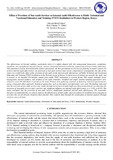Effect of Provision of Non-Audit Services on Internal Audit Effectiveness in Public Technical and Vocational Education and Training (TVET) Institutions in Western Region, Kenya

View/
Date
2023-10-19Author
Aluvala, Beryl Lihavi
Tibbs, Charles. Y.
Kiongera, Fredrick
Metadata
Show full item recordAbstract
The effectiveness of internal auditing, particularly when it is tightly aligned with risk management frameworks, compliance standards, and strengthened internal controls, attracts substantial attention worldwide, particularly from governing authorities. This attention is directly derived from the distinct operational role that government sectors have in fostering economic activity. To achieve internal audit effectiveness, the provision of non-audit services must not be compromised. Consequently, the aim of this study is to establish the effect of the provision of non-audit on the internal audit effectiveness of Public Technical and Vocational Education and Training (TVET) institutions in the Western region of Kenya. A causal research design was used for the study, and it focused on an intended 116-member sample from public TVET institutions in western Kenya. This sample included senior management, internal auditors, and members of the audit committee. Stratified and simple random sampling approaches were utilized to select 89 individuals to partake in the study. Primary data gathering consisted of deploying structured questionnaires using a drop-and-collect approach. Statistical approaches, such as descriptive and inferential, were used. The findings indicated that the provision of non-audit services may render the function of internal audit ineffective. Regression analysis revealed that the provision of non-audit services had a positive and significant influence on internal audit effectiveness (t = 5.183, p<0.05). The study concluded that the provision of non-audit services significantly predicted internal audit effectiveness. The researcher therefore recommended that, in order to improve the effectiveness of their audits, internal auditors be prohibited from engaging in activities that are not directly related to their function. This could be done through the sensitization of internal auditors through seminars and workshops.
URI
https://doi.org/10.51867/ajernet.4.2.59https://ajernet.net/ojs/index.php/ajernet/article/view/147
http://ir-library.mmust.ac.ke:8080/xmlui/handle/123456789/2405
Collections
- Gold Collection [1028]
